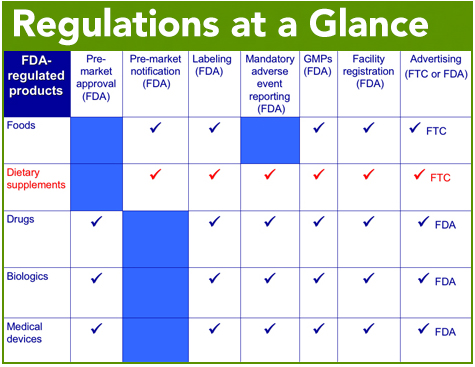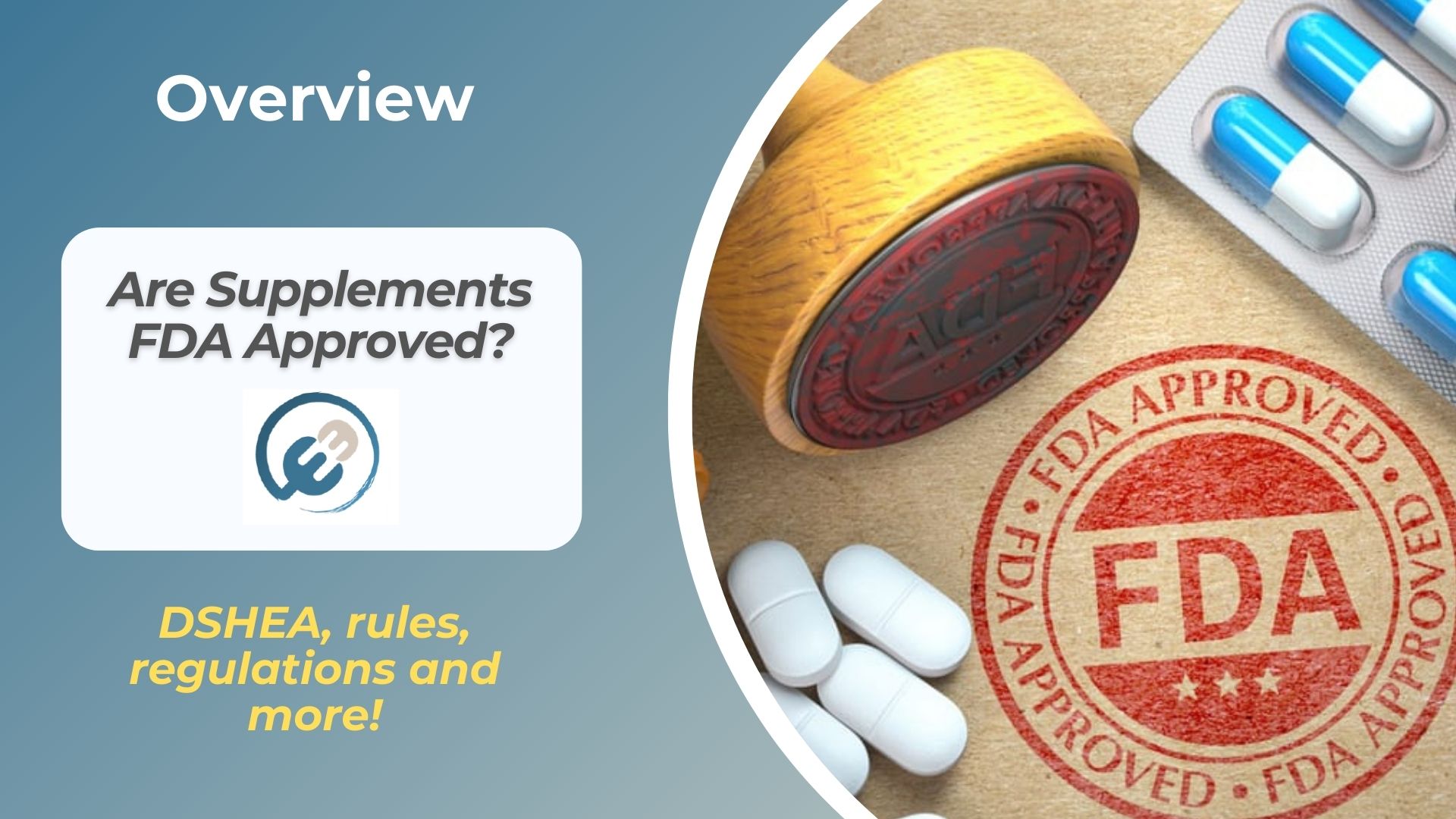When it comes to supplements, there are a lot of questions about whether or not they are Food and Drug Administration (FDA) approved.
The truth is, most supplements are not actually FDA approved. However, this does not mean that they are unsafe. In fact, many supplements are perfectly safe and effective when used correctly.
In this blog post, we will discuss the difference between FDA approved supplements and those that are not approved by the FDA.
We will also talk about the safety of unapproved supplements and how to choose the right supplement for your needs.
Federal Regulations on Dietary Supplements

Dietary supplements are considered food by the FDA. This is different from how the FDA regulates drugs, which must go through a more intensive process to show they are safe and effective before they hit the market.
So, while supplements don’t need FDA approval to be sold, they are still held to certain safety and labeling standards. These standards are in place to ensure that supplements are safe for consumers and that they are accurately labeled.
For example, all supplements must list their ingredients on the label, and manufacturers are not allowed to make false claims about their products. In addition, the FDA monitors supplement manufacturing facilities to ensure that they meet good manufacturing practices. These practices help to ensure the quality and consistency of dietary supplements.
Overall, federal regulations on dietary supplements help to protect consumers and ensure that they are getting what they expect when they purchase these products.
FDA food regulations versus FDA drug regulations
However, there is a difference between FDA food regulations versus FDA drug regulations. Drug regulations are much more stringent, as drugs are subject to greater scrutiny due to their potential for harm. As a result, food manufacturers have more leeway when it comes to complying with FDA regulations.
This can sometimes lead to confusion on the part of consumers, who may not be aware of the different standards that apply to food and drugs. Ultimately, it is important to be informed about the regulations governing the food we eat, so that we can make informed choices about what we put into our bodies.
The Dietary Supplement Health and Education Act (DSHEA)

The Dietary Supplement Health and Education Act (DSHEA) was passed in 1994 and it outlines these safety and labeling standards. Under DSHEA, manufacturers are responsible for ensuring that their products are safe and that any health claims made on the labels are accuracy backed up by science.
Read the official 1994 DSHEA law here.
To summary, DSHEA places dietary supplements into 4 main criteria:
- Classifies dietary supplements as food, not drugs;
- Establishes a framework for regulating dietary supplements;
- Requires manufacturers to provide safety information about their products.
- DSHEA also allows manufacturers to make specific claims about the health benefits of their products, as long as those claims are backed up by science.
However, the FDA does have the authority to regulate dietary supplements if they pose a safety risk.
For example, the FDA has issued warnings about certain supplements that contain potentially harmful ingredients. As a result of DSHEA, consumers have access to a wide variety of dietary supplements.
But it’s important to remember that not all supplements are created equal, and some may not be safe for everyone.
Talk to your doctor before taking any dietary supplement, especially if you have any underlying health conditions.
There are steps you can take as a consumer to help ensure you are taking a quality supplement.
1. Check the expiration date:
When it comes to taking vitamins, it’s important to pay attention to expiration dates. Vitamins typically only remain effective for a certain period of time after they’re manufactured.
Once the expiration date has passed, the vitamin may no longer be effective. As a result, it’s important to check the expiration date before taking any vitamin. By doing so, you can ensure that you’re getting the most out of your vitamin and that you’re not wasting your time or money.
2. Look for third-party certification:
When you are looking for a vitamin, you should also look for one that has been certified by a third party. Third-party certification organizations test vitamins to ensure that they meet quality standards. Some of the most well-known organizations include the United States Pharmacopeia (USP), ConsumerLab, and NSF International.
While GMP is a fine certification, it’s really USP, ConsumerLab and NSF International which are the gold standards for third-party certification.
These organizations have teams of experts who analyze vitamins for purity and potency. They also screen for contaminants, such as heavy metals, to ensure that products are safe for consumption.
Furthermore, these organizations often require companies to adhere to good manufacturing practices. As a result, you can be confident that a vitamin that has been certified by a third party meets high standards of quality and safety.
You can also learn about popular dietary supplement manufacturers here, most of which have these third party certifications.
3. Check the ingredient list:
Checking the ingredient list on a vitamin bottle is a great way to get an idea of its quality. All of the ingredients should be listed in descending order by weight, and they should be consistent with what is advertised on the bottle.
You should also be able to recognize all of the ingredients on the list. If you can’t, it’s possible that the vitamin is not of high quality.
Quality vitamins will have ingredients that you recognize and that are listed in descending order by weight. Make sure to check the ingredient list next time you’re looking for a high-quality vitamin!
Look if ingredients have meta analysis scientific support
If you’re trying to pick the most effective ingredients for your skincare routine, it’s important to look for ones that have been backed by scientific research.
Meta-analyses are a good way to evaluate the overall body of evidence on a particular topic, and they can be very helpful in determining which ingredients are supported by the scientific community and which ones aren’t.
When looking at meta-analyses, pay attention to things like the sample size, the quality of the studies included, and the conclusions that were reached. This will help you to determine whether or not an ingredient is truly effective and worth using in your skincare routine.
4. Avoid vitamins with fillers:
When choosing a vitamin supplement, it is important to read the label carefully. Some products may claim to be all-natural or 100% pure, but they may actually contain synthetic ingredients or fillers. These fillers can reduce the effectiveness of the vitamin and may even be dangerous to your health.
For example, some fillers are made from heavy metals like lead or mercury. Others may contain artificial colorings or preservatives.
To be sure you are getting a quality product, look for vitamins that are certified organic and free of any fillers or additives. You may pay a bit more for these vitamins, but they will be worth it for your health.
5. Choose a vitamin that is easy to take:
When it comes to vitamins, there are many different options to choose from. However, not all vitamins are created equal. Some forms of vitamins are easier to take than others.
For example, if you have trouble swallowing pills, you may want to choose a liquid vitamin instead. Liquid vitamins are easy to take and can be taken with water or juice. They are also less likely to cause stomach upset than other forms of vitamins. If you are looking for a vitamin that is easy to take, consider choosing a liquid vitamin.
6. Consider your needs:
When it comes to vitamins and supplements, it’s important to consider your own needs before making a purchase. For example, if you’re hoping to improve your bone health, you may want to look for a vitamin that contains calcium or vitamin D.
If your goal is to improve your cardiovascular health, on the other hand, you may want to seek out a vitamin that contains omega-3 fatty acids. By taking the time to understand your own needs, you’ll be better equipped to choose a supplement that can truly benefit your health.
7. Talk to your doctor:
If you have any medical conditions or are taking any medications, it is important to talk to your doctor before taking a vitamin supplement. This is because some vitamins can interact with medications or may not be appropriate for people with certain medical conditions.
Conclusion:
In short, dietary supplement companies are regulated by the FDA but this regulation does not guarantee safety or effectiveness. While the vast majority of the time dietary supplement products are safe and adhere to current good manufacturing practices, nutritional supplements do involve health risks.
As a consumer, you can take steps to ensure you are taking a quality supplement by looking for products that have been certified by third-party organizations or tested in clinical trials.
Finally, it is important to do your research before making a purchase. Make sure that the product you are buying is of high quality and contains ingredients that are backed by science. It is also important to consider your own needs and consult with your doctor before taking any supplements.
If you want more info about supplements and vitamins, including how to read labels, myths and more – read our ultimate guide for beginners who want to start taking supplements and vitamins.
What are your thoughts? Do you feel safe taking supplements despite not having FDA approval? Let us know in the comments below!



